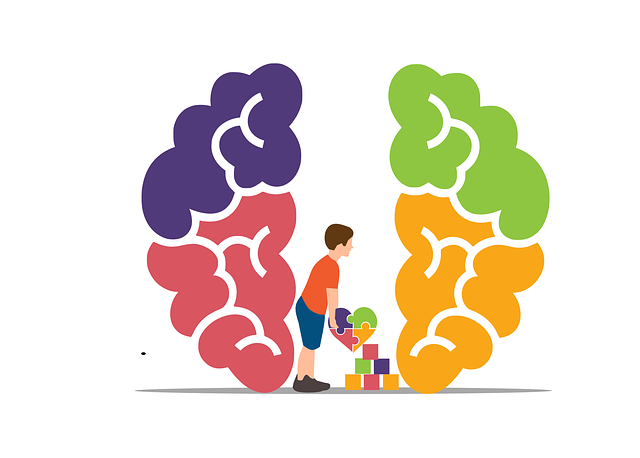Resilience, Flexibility, and Mastery (RFM) is a transformative therapeutic framework for individuals with neuro disorders, combining tailored exercises focusing on community engagement, stress management, coping skills, and problem-solving. This holistic approach, which includes regular physical exercise like mindfulness meditation, yoga, and aerobic activities, enhances cognitive function, improves mood, and boosts brain health. Compassion cultivation practices integrated into these routines promote emotional well-being and reduce anxiety and depression symptoms. A nuanced, context-aware design for resilience-building exercises, led by therapists or through online platforms, is crucial for effectiveness. RFM techniques like Recall, Fantasy, Meaning (RFM) improve self-esteem, adaptive coping strategies, and mental health, with real-life success stories demonstrating its power in overcoming challenges like burnout and trauma.
Resilience is a powerful tool for managing neuro disorders, and RFM (Recovery, Flexibility, and Mastery) exercises offer a unique approach to building it. This comprehensive guide explores how structured activities can enhance recovery and improve daily living. We delve into the science behind exercise’s impact on the brain, provide practical tips for designing effective RFM sessions, and share inspiring success stories from individuals who have transformed their lives through this powerful therapy for neuro disorders.
- Understanding RFM: A Framework for Resilience
- The Role of Exercise in Neuro Disorder Management
- Designing Effective Resilience Building Exercises
- Incorporating RFM into Daily Routines
- Real-Life Success Stories: RFM in Action
Understanding RFM: A Framework for Resilience

Resilience is a powerful tool for individuals navigating life’s challenges, especially those with neuro disorders who often face unique obstacles. Understanding RFM—a framework that stands for Resilience, Flexibility, and Mastery—is akin to acquiring a compass for emotional healing processes. This approach equips individuals with strategies to adapt and grow in the face of adversity, fostering mental wellness.
Incorporating RFM into therapy for neuro disorders involves tailored exercises designed to build resilience. These may include community outreach program implementations that encourage social interaction and support networks, enhancing flexibility through stress management techniques, and promoting mastery by teaching coping skills and problem-solving strategies. By embracing this framework, individuals can transform challenges into opportunities for growth, ultimately improving their overall mental wellness.
The Role of Exercise in Neuro Disorder Management

Regular physical exercise has emerged as a powerful tool in managing neuro disorders, offering more than just physiological benefits. It plays a pivotal role in enhancing cognitive function, improving mood, and boosting overall brain health. When integrated into treatment plans, exercises such as mindfulness meditation, yoga, and aerobic activities can serve as effective therapy for neuro disorders. These activities stimulate the release of neurotransmitters, which are chemical messengers in the brain, leading to improved communication between nerve cells.
Moreover, compassion cultivation practices have gained recognition for their positive impact on mental health awareness and resilience building. Engaging in regular exercise routines encourages a sense of calm and self-compassion, reducing symptoms of anxiety and depression often associated with neuro conditions. By fostering a mindful approach to movement, individuals can develop coping mechanisms that promote emotional well-being and enhance their ability to navigate life’s challenges, ultimately contributing to improved mental health outcomes.
Designing Effective Resilience Building Exercises

Designing effective resilience-building exercises is a nuanced process that requires a deep understanding of the target audience, their specific needs, and the context in which they will be implemented. For individuals with neuro disorders, tailored activities can significantly enhance coping mechanisms and overall well-being. Therapists play a pivotal role in creating these exercises, ensuring they are accessible and engaging while aligning with the principles of therapy for neuro disorders.
A successful resilience-building program should incorporate various strategies such as mindfulness practices, cognitive reframing techniques, and stress management skills. These can be delivered through group sessions, online platforms, or even personalized one-on-one therapies. Public awareness campaigns and ongoing professional development in mental health awareness, including risk assessment for mental health professionals, are essential to promote these exercises widely and ensure their effectiveness.
Incorporating RFM into Daily Routines

Incorporating RFM (Recall, Fantasy, and Meaning) into daily routines can significantly enhance resilience and well-being, especially for individuals navigating therapy for neuro disorders. This simple yet powerful technique encourages self-reflection and creative expression. By dedicating a few minutes each day to recall past experiences, imagine ideal scenarios, and attach personal meaning to these thoughts, one can boost self-esteem improvement and develop more adaptive coping strategies.
The RFM process fosters empathy building strategies by promoting understanding of both internal and external experiences. Engaging in Self-Awareness Exercises within the RFM framework allows individuals to identify triggers, explore emotions, and reframe negative thought patterns. This proactive approach can lead to profound shifts in perspective, fostering a sense of control and empowerment, ultimately contributing to overall mental health and resilience.
Real-Life Success Stories: RFM in Action

In the realm of therapy for neuro disorders, Real-Life Success Stories (RFM) stand as a testament to the power of resilience building exercises. These narratives showcase individuals who have overcome significant challenges, such as burnout prevention and trauma support services, through targeted interventions. By participating in RFM programs, many have achieved remarkable progress in mood management, demonstrating that with the right tools and support, even the most daunting obstacles can be navigated.
One notable example involves a patient struggling with chronic stress and anxiety. Through a series of RFM exercises designed to foster resilience, this individual learned effective coping strategies, enhanced their ability to manage stressors, and ultimately improved their overall mental well-being. Similar success stories abound, highlighting the versatility and effectiveness of these exercises in addressing various neurodisability concerns, including burnout prevention and mood regulation issues, thereby enriching the lives of those seeking therapy for neuro disorders.
Resilience is a powerful tool in managing neuro disorders, and by incorporating RFM (Recollection, Focus, and Movement) exercises into daily routines, individuals can significantly enhance their coping abilities. This article has explored the role of RFM as a therapeutic framework, its synergistic effects with exercise, and real-life success stories that underscore its effectiveness. By understanding and applying these principles, folks can foster resilience, navigate challenges, and even revolutionize their journey towards better mental health. In terms of therapy for neuro disorders, RFM offers a holistic approach that combines cognitive, physical, and emotional elements, promising a brighter and more resilient future.








